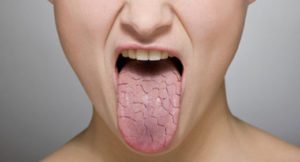DOC’s Dr. Clark Hammock has recently been featured in the Arthritis Services of Charlotte and Mecklenburg County quarterly newsletter. This is the first of four articles addressing oral health and arthritis.
Assuming you’re not about to speak before a large crowd or just finished watching the new season of “The Walking Dead” on Netflix, there’s no reason your mouth should be unusually dry. If it is you may very well be suffering from dry mouth or what those in the medical field call xerostomia. More a disorder than a disease, this primarily happens when the salivary glands simply stop producing enough saliva.
There are many causes for dry mouth and one of the most frequent is the resulting side effect of certain medications like antihistamines and certain antidepressants. This may be corrected by simply switching to an alternate medicine if that’s an option. Radiotherapy to the head or neck can also damage salivary glands. Other causes include excessive mouth breathing due to heavy exertion or blocked sinuses, dehydration due to low body fluids, and even anxiety. There is also the possibility of Sjogren’s syndrome (pronounced SHOW-grun’s), an autoimmune disease that often accompanies other immune system disorders such as rheumatoid arthritis and lupus. Along with affecting the joints, Sjogren’s syndrome symptoms include dry eyes and dry mouth.
Whatever the cause, dry mouth is very uncomfortable resulting in trouble chewing, tasting and swallowing, the sensation of a burning throat or mouth, cracked lips, mouth sores and a dry, rough tongue. It can also produce myriad dental problems. Less saliva can cause a decrease in the acidity levels in the mouth leading to increased bacterial growth which can in turn promote bad breath, gingivitis and extensive tooth decay.
While there are medicines available to help increase saliva production, other treatments include constantly sipping water or misting the mouth with water, chewing sugarless gum or taking an over-the-counter saliva substitute containing carboxymethylcellulose, hydroxyethylcellulose, or glycerin. Caffeine, tobacco and alcohol should be avoided as these actually dry the mouth out further. It’s also a good idea to avoid salty and spicy foods. Using a humidifier when going to bed at night may be helpful as well.
Meticulous oral hygiene is critical when battling dry mouth. Along with regular brushing (at least twice a day) and flossing, use fluoride rinses daily. There are advanced toothpastes available with added phosphorous and calcium that can help prevent tooth decay and cavities. More frequent dental cleanings may be appropriate depending on the severity and symptoms of dry mouth.
Be sure to consult with your doctor and dentist when you first notice any symptoms of continuing dry mouth. They can help you devise an appropriate treatment plan and offer other suggestions for immediate relief.




